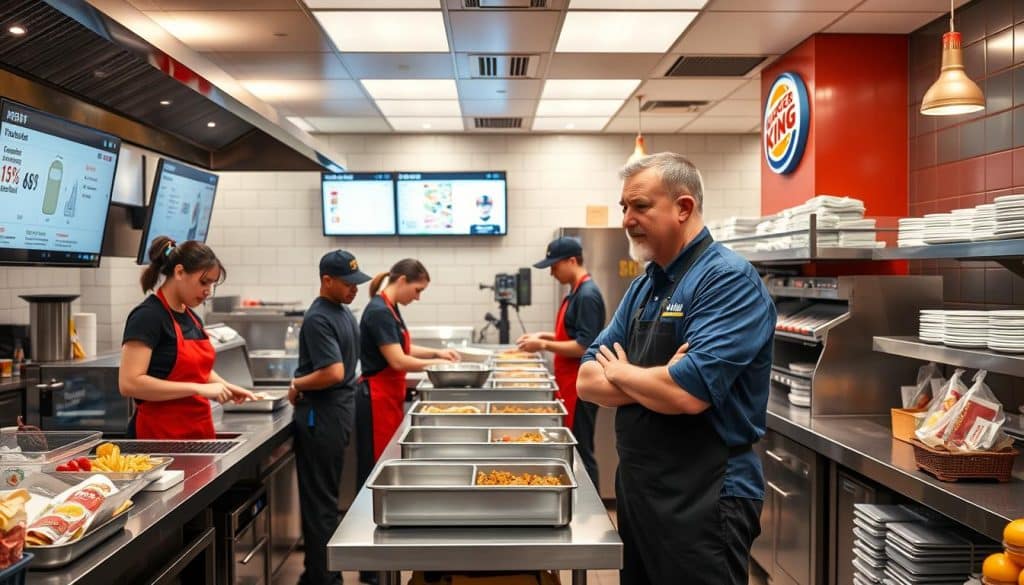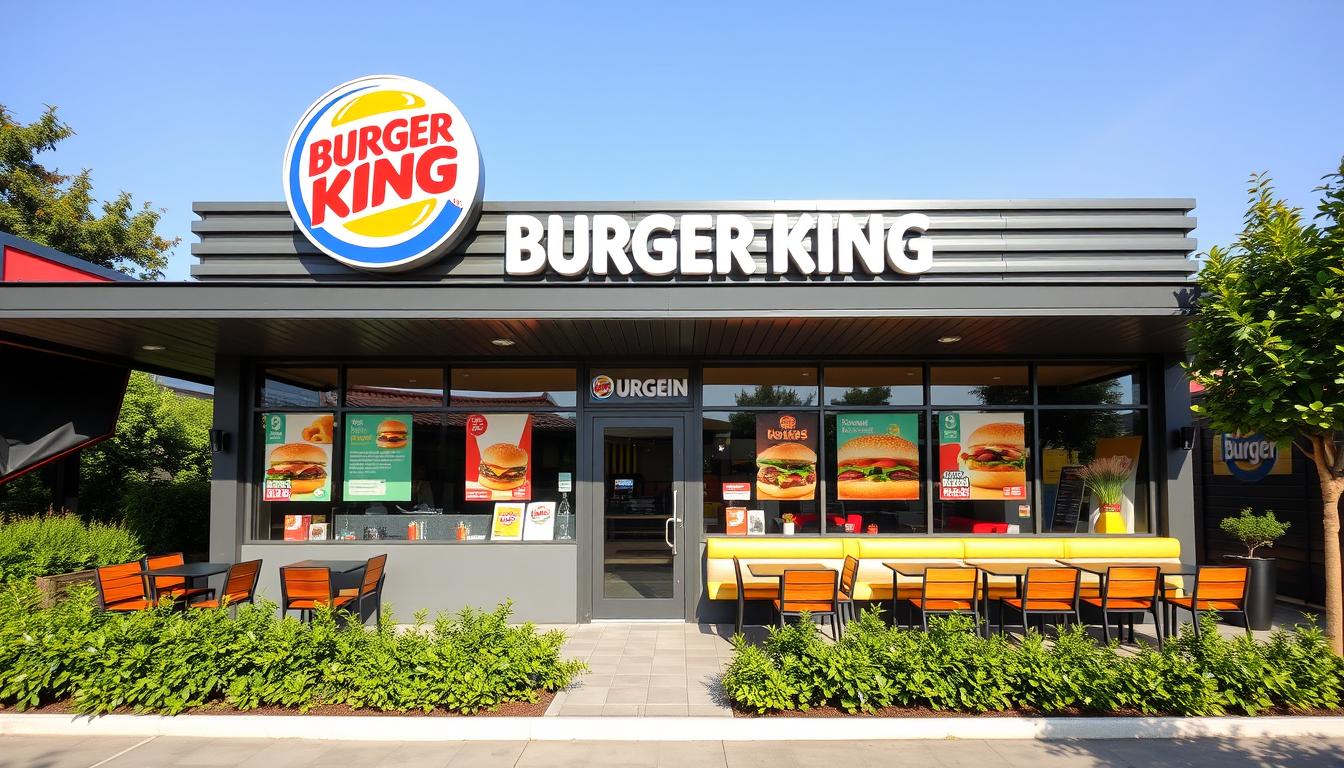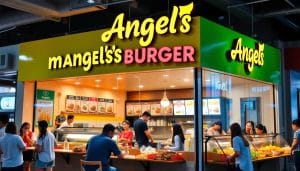Ever thought about joining the Burger King family? It’s a big step into the fast food world. The Burger King franchise is a great chance for entrepreneurs. But, it comes with big costs and rules to follow.
In this article, we’ll look at the costs of starting a Burger King franchise. This includes the initial investment and ongoing fees. We want to give you a clear picture of what it takes to be a Burger King franchisee.
Key Takeaways
- Initial franchise fee of $50,000 and a total net worth requirement of at least $1 million.
- Liquid assets must be a minimum of $500,000 to qualify but could vary based on location and restaurant type.
- Ongoing fees, including 4.5% royalty and 4.0% advertising contributions, will impact the profitability of the franchise.
- Support systems like BK University can ensure franchisees are well-prepared for operations.
- Potential for both traditional and nontraditional development opportunities, providing flexibility in location choices.
Introduction to Franchise Opportunities
The fast food franchise market is full of great options for new entrepreneurs. Brands like Burger King offer strong franchise chances. They use a known name and a winning business plan. It’s key for investors to understand this market well.
Overview of the Fast Food Franchise Market
The fast food franchise market is booming. Almost all Burger King spots are franchises. With over 18,700 franchises worldwide, it’s a chance to join a famous brand.
Investors need to know the market well. This helps them make smart choices about owning a franchise.
Importance of Choosing the Right Franchise
Choosing the right franchise is key to success. Investors should look at the brand’s reputation, training, and support. For example, Burger King’s new owners get about three weeks of training.
This can be adjusted based on the owner’s needs. They also work on a 90-day business plan. Having a strong support network is also important.
Understanding the Burger King Brand
The Burger King brand is a top name in fast food. It started in 1954 in Miami, Florida. Today, it’s the second biggest fast food chain, with over 19,000 locations in more than 100 countries.
Every day, over 11 million people visit Burger King. This shows how popular and successful it has become.
History of Burger King
From the start, Burger King has focused on tasty, flame-grilled burgers. It has grown by listening to what customers want and staying true to quality and new ideas. For over 65 years, it has been a place where families can enjoy a meal together.
As it grew worldwide, Burger King introduced new tech like digital kiosks and better delivery. This made the dining experience better for everyone.
Mission and Vision of Burger King
The Burger King mission is to serve high-quality fast food that meets customer needs. It aims to keep innovating. The vision is to grow globally while caring for the planet.
This approach makes Burger King a great choice for investors. It’s a brand that keeps getting better and is ready for the future.
Initial Investment Requirements
Starting a Burger King franchise requires understanding different financial commitments. The cost includes various parts that future franchisees must think about before investing. The base cost is the franchise fee, which is $50,000. This fee lets you use the Burger King brand and its ways of working.
But, there are many other costs to consider when starting a franchise.
Franchise Fee Breakdown
The cost to start a Burger King franchise changes based on the type of restaurant. The investment can be as low as $247,300 for a Delivery Restaurant or up to $4,670,900 for a Freestanding model. You also need to budget for improvements and construction, which can cost between $1 million and $1.8 million.
Real property costs can range from $300,000 to $1.5 million. This shows how important it is to plan your finances carefully.
Cost of Equipment and Supplies
The cost of equipment and supplies is key to the total investment needed. Franchisees must buy kitchen equipment and think about ongoing costs for inventory and supplies. These costs add up to the total cost of starting a Burger King franchise.
It’s vital for those interested to do market research and plan their budget well before starting.
Ongoing Fees and Royalty Payments
Franchisees in the Burger King system need to know about ongoing fees. These fees are key to the brand’s success. They include burger king franchise royalties and advertising contributions.
Understanding Monthly Royalties
The royalty for Burger King is 4.5% of monthly sales. This shows the importance of keeping sales up to cover fees. It helps the brand grow and support its franchisees.
The brand has a lower failure rate of 9% over three years. This is compared to an industry average of 11%. It shows the brand’s financial stability for those who understand these fees.
Advertising Contributions
Franchisees also pay 4% of monthly sales for advertising. This is essential for marketing campaigns. It helps make the brand more visible.
With 11 million customers daily, strong advertising is critical. Franchisees should also plan for training fees and contributions to the Burger King Foundation. These efforts strengthen the brand and local market presence.
Location and Site Selection
Choosing the right location is key for a Burger King franchise’s success. The right spot can boost revenue and attract more customers. Franchisees need to know what makes a good location to make a smart choice.
Criteria for Choosing a Location
Several factors are important when picking a location for a Burger King. Being close to busy places like shopping centers and highways helps. The area’s demographics should match Burger King’s target customers.
It’s also important to check if the market can handle another fast-food place. A careful look at these site selection criteria can help improve profits.
Importance of Market Analysis
Doing a deep market analysis is vital for those interested in franchising. This helps understand what customers like and how Burger King fits into the market. Knowing about foot traffic, local eating habits, and the economy helps pick the best spot.
Accessing detailed market analysis can help make better decisions. For more on real estate needs, check out this resource.
Operational Support from Burger King
Burger King focuses on helping its franchisees succeed. It offers a detailed plan to boost efficiency and performance. Before opening, franchisees go through Burger King’s training programs.
These programs teach the importance of doing things right and managing well. They prepare franchise owners for the fast-food world’s challenges.
Training and Support Programs
The training covers important topics like customer service, food making, and marketing. It’s designed to help franchisees meet Burger King’s high standards. They also get ongoing learning chances and extra help.
Franchisee Assistance Services
Burger King doesn’t stop at just training. It keeps helping franchisees to do well over time. They get marketing tools and a support team for help.
The company checks how well things are going and asks for feedback. This helps franchisees stay up-to-date with new strategies and market needs.

Legal Considerations for Franchisees
For those wanting to become Burger King franchisees, understanding legal aspects is key. The Franchise Disclosure Document (FDD) is a critical starting point. It outlines financial and legal duties that franchisees must grasp before signing.
Importance of the Franchise Disclosure Document (FDD)
The Burger King FDD is a must-read for future franchisees. It shares the company’s background, how to run the business, and financial data. By carefully reviewing the FDD, you can gauge the franchise’s worth and spot any risks.
Understanding Franchise Agreements
Franchise agreements define the bond between Burger King and its franchisees. They cover how to run the business, fees, and where you can operate. Knowing these agreements well helps franchisees follow rules and increase profits. It’s also important to understand the role of making independent hiring decisions and legal cases that might affect your business.
Marketing and Brand Promotion
Good marketing is key to making a franchise stand out and get more customers. For Burger King franchisees, local marketing is vital. It helps them connect with the community. Things like loyalty programs and teaming up with local businesses build a strong presence.
Getting involved in the community boosts brand loyalty. It makes customers feel like they belong. This leads to more people visiting the restaurant.
Strategies for Local Marketing
Franchisees can use many marketing strategies to reach out locally. Outdoor ads like billboards grab the attention of people in busy spots. Also, matching local promotions with community events helps get the brand seen more.
Knowing what the local people like helps tailor the menu. This can make a big difference in success.
Leveraging National Promotions
Using national promotions also helps a lot. Burger King runs big ads on TV, in papers, and online. Campaigns like “Burn That Ad” have made the brand more famous. They also got people talking and involved.
By joining in on these big campaigns, franchisees get to use the brand’s fame. This brings in more customers and boosts sales.

Franchisee Success Stories
Successful Burger King franchisees share valuable lessons for those thinking of investing. Their stories highlight key strategies for success in the fast-food world. They show how being adaptable and using strong management skills can lead to success.
Case Studies of Successful Burger King Owners
Garnett Station Partners bought a struggling 23-unit Burger King in 2014. By 2019, they had 166 Burger King and 55 Popeyes locations. Their use of technology and community involvement helped them grow.
After selling to Carrols Restaurant Group, they talked about building wealth through smart management. Burger King franchises in the U.S. saw their average profit jump to $205,000. This shows the chance for success in the business.
Lessons Learned from Franchisees
Franchisee success stories teach important lessons. Building strong relationships with landlords and investing in locations are key. Using technology, like software for food and labor costs, keeps businesses competitive.
These stories highlight the importance of focusing on customers, having good staff, and keeping operations modern. They offer a guide for those wanting to succeed as franchise owners.
Conclusion: Evaluating the Burger King Franchise Opportunity
Looking into the Burger King franchise means checking out the investment, costs, and support it offers. The brand is well-known and has a big presence worldwide. It provides great training and marketing tools to help franchisees succeed.
Key Takeaways for investors
Investors thinking about Burger King should consider both the good and bad sides. The brand faces tough competition and must keep up with changing tastes. But, it also has chances to grow and diversify its products.
Using data for inventory, labor, and sales can help franchisees make better choices. This can improve how they run their business and serve customers.
Final Thoughts on Joining the Burger King Family
Joining Burger King could be a smart move for those looking for a rewarding business venture. By matching their skills with the brand’s needs and focusing on employee growth, franchisees can increase profits and improve customer satisfaction. The Franchise Success System (FSS) helps measure success, making Burger King a great choice for those in the fast-food industry.
FAQ
What is the cost to open a Burger King franchise?
What are the requirements to become a Burger King franchisee?
FAQ
What is the cost to open a Burger King franchise?
Opening a Burger King franchise costs between 0,000 and ,670,000. This includes a ,000 initial franchise fee.
What are the requirements to become a Burger King franchisee?
To become a Burger King franchisee, you need at least
FAQ
What is the cost to open a Burger King franchise?
Opening a Burger King franchise costs between $250,000 and $4,670,000. This includes a $50,000 initial franchise fee.
What are the requirements to become a Burger King franchisee?
To become a Burger King franchisee, you need at least $1 million in total net worth. You also need $500,000 in liquid assets.
How does one apply for a Burger King franchise?
To apply, start by filling out the Burger King franchise application. It’s available on their official website.
What ongoing fees should franchisees expect?
Franchisees pay ongoing fees. This includes a 4.5% royalty fee on monthly sales and a 4% marketing contribution.
What support does Burger King provide to its franchisees?
Burger King offers a lot of support. This includes training, marketing help, and management workshops to help franchisees succeed.
How important is location when opening a franchise?
Location is very important for success. Look for places with a lot of traffic, good demographics, and do a market analysis.
What legal documents are involved in franchising with Burger King?
Franchisees need to understand the Franchise Disclosure Document (FDD) and the franchise agreement. These documents outline financial and legal responsibilities.
What marketing strategies should franchisees consider?
Franchisees should use local marketing like community events and loyalty programs. They should also use national promotions to get more visibility.
What lessons have successful Burger King franchisees shared?
Successful franchisees say community involvement, good staffing, and quick business responses are key. They also focus on what customers want.
Is there a substantial demand for Burger King franchises?
Yes, Burger King franchises are in demand. The brand’s global presence and loyal customer base make them attractive.
million in total net worth. You also need 0,000 in liquid assets.
How does one apply for a Burger King franchise?
To apply, start by filling out the Burger King franchise application. It’s available on their official website.
What ongoing fees should franchisees expect?
Franchisees pay ongoing fees. This includes a 4.5% royalty fee on monthly sales and a 4% marketing contribution.
What support does Burger King provide to its franchisees?
Burger King offers a lot of support. This includes training, marketing help, and management workshops to help franchisees succeed.
How important is location when opening a franchise?
Location is very important for success. Look for places with a lot of traffic, good demographics, and do a market analysis.
What legal documents are involved in franchising with Burger King?
Franchisees need to understand the Franchise Disclosure Document (FDD) and the franchise agreement. These documents outline financial and legal responsibilities.
What marketing strategies should franchisees consider?
Franchisees should use local marketing like community events and loyalty programs. They should also use national promotions to get more visibility.
What lessons have successful Burger King franchisees shared?
Successful franchisees say community involvement, good staffing, and quick business responses are key. They also focus on what customers want.
Is there a substantial demand for Burger King franchises?
Yes, Burger King franchises are in demand. The brand’s global presence and loyal customer base make them attractive.





